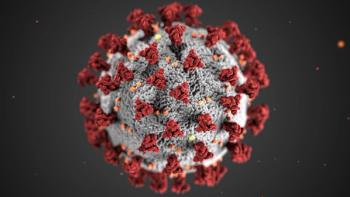
Updated results confirmed the safety and efficacy of the quadruplet regimen of fixed-dose isatuximab-irfcc in combination with bortezomib, lenalidomide, and dexamethasone for newly diagnosed multiple myeloma with no immediate intent for transplant.

Your AI-Trained Oncology Knowledge Connection!


Updated results confirmed the safety and efficacy of the quadruplet regimen of fixed-dose isatuximab-irfcc in combination with bortezomib, lenalidomide, and dexamethasone for newly diagnosed multiple myeloma with no immediate intent for transplant.

The combination of daratumumab plus lenalidomide and dexamethasone demonstrated a significant overall survival benefit compared with lenalidomide and dexamethasone alone for patients with newly diagnosed multiple myeloma.

The phase 3 POSEIDON trial indicated that patients with metastatic non–small cell lung cancer who were treated with first-line durvalumab and chemotherapy with or without tremelimumab experienced a statistically significant survival benefit.

The use of onvansertib in combination with standard-of-care chemotherapy had an increase in the objective response rate and progression-free survival during the phase 1b/2 trial for metastatic colorectal cancer.

Patients with EGFR-mutated non–small cell lung cancer who were treated with ado-trastuzumab emtansine and osimertinib experienced minimal anti-tumor outcomes.

Previously platinum-treated patients with EGFR exon 20 insertion mutation–positive non–small cell lung cancer saw clinical activity with mobocertinib regardless of prior PD-1/PD-L1 inhibitor history.

The introduction of targeted therapies and immunotherapeutics may work to improve survival for patients with T-cell acute lymphoblastic leukemia.

The anti-PD-1 antibody spartalizumab demonstrated promising responses in patients with recurrent/metastatic nasopharyngeal cancer.

In the early days of the COVID-19 pandemic, patients with malignant pleural mesothelioma were more likely to be hospitalized or die from COVID-19 versus the overall population.

Durable efficacy and a manageable safety profile were observed with selpercatinib for Chinese patients with advanced, RET fusion–positive non–small cell lung cancer.

For patients with KRAS G12C–mutated non–small cell lung cancer and stable brain metastases who were previously treated with either radiation or surgery, robust anticancer activity was observed with intracranial complete responses and continued intracranial stabilization with sotorasib.

Patients with EGFR-positive non–small cell lung cancer whose disease is not suitable for standard EGFR TKI monotherapy had promising responses and experienced few dose-limiting toxicities with pelcitoclax plus osimertinib.

Patients with stage IIIB and stage IV advanced squamous non–small cell lung cancer experienced a clinically significant improvement in progression-free survival with tislelizumab plus chemotherapy in the first-line setting compared with standard of care chemotherapy.

Data from the ARROW study demonstrated safety and efficacy of pralsetinib in a cohort of Chinese patients with RET fusion–positive non–small cell lung cancer.

In a phase 1/2 trial, the selective targeting of EGFR exon 20 insertion mutations with mobocertinib in patients with previously treated non–small cell lung cancer resulted in superior patient-reported outcomes.

Clinical decision-making based on minimal residual disease may be associated with improved therapy satisfaction and optimized post-remission treatment for patients with intermediate-risk acute myeloid leukemia.

A recent study provides evidence showing that focal 22q11.22 deletions may be correlated with poor outcomes in patients with pediatric B-cell acute lymphoblastic leukemia with alterations in IKZF1.

Findings from the phase 2 NRG-LU001 trial indicated that the addition of metformin to radiotherapy did not improve survival outcomes in patients with non–small cell lung cancer.

RenovoCath, which was granted a new 510(k) clearance by the FDA, distributes chemotherapy directly to solid tumors via the arteries, opening avenues for a more targeted treatment.

After implementing disparity and demographic reporting in acute leukemia clinical trials, investigators did not report an increase in diverse trial participants.

The combination of zanubrutinib and zandelisib for the treatment of B-cell malignancies may offer patients the opportunity to receive therapy that is not based around chemotherapy.

Patients have higher odds of experiencing rapid relapse in triple-negative breast cancer if they have Medicaid or no insurance, are single, are Black, and have not undergone surgery.

Patients taking teclistamab for relapsed or refractory multiple myeloma saw durable response, and a well-tolerated toxicity profile.

Elizabeth Comen, MD, discusses how she balances her love of dance with both her family and her career as a breast cancer oncologist.

The recommended phase 2 dose for lenvatinib was 14 mg/m2 in relapsed/refractory osteosarcoma.

Data collected from several large studies of women with breast cancer over the age of 65 years at diagnosis show how frequently certain known pathogenic variants occur in different patient subsets.

Genomic classifier scores and basal-luminal subtypes may be biomarkers of response for patients with nonmetastatic castration-resistant prostate cancer treated with apalutamide plus androgen deprivation therapy.

Zanubrutinib and zandelisib combination appears to be a well-tolerated regimen for the treatment of B-cell malignancies, according to early study results.

A large meta-analysis showed a one-third reduction in recurrence or death in patients with HER2-positive early breast cancer with 1 year of trastuzumab added to chemotherapy, confirming the benefit of this therapy across baseline characteristics.

A 3-arm randomized study indicated that domvanalimab-based combinations yielded a promising overall response rate for patients with metastatic non–small cell lung cancer with a PD-L1 status of 50% or more.